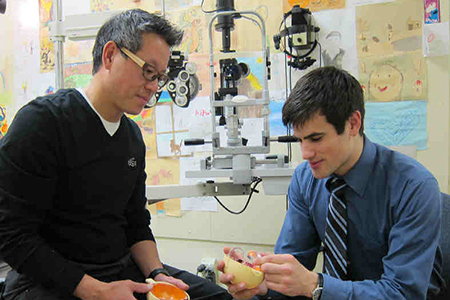You might not have pictured yourself as an engineer—but that could be because you don’t yet know the places where engineering can take you. Consider this: engineers are developing the next generation of mobile technology creating new tools to help save the environment and finding ways to improve people’s lives. Engineers are always in demand and can be found in almost every industry. As a group engineering majors currently have the highest reported overall average salary at the bachelor’s level. The current average salary for 2012 graduates stands at $60,639.*
WHERE CAN ENGINEERING TAKE YOU?
Examples of engineering can be found everywhere in our daily lives points out Dr. Manos Maragakis, Engineering Dean for the University of Nevada Reno. “From the cars you drive to the roads you drive on to the smartphones you use to the air we breathe and the water we drink” says Maragakis “all of this is engineering.”
“Engineers are needed almost everywhere,” adds Dr. W. L. Scheller II, Head of the Industrial and Manufacturing Engineering Department at Kettering University. “In addition to positions in manufacturing industrial engineers are found in hospitals shipping and logistics companies (think UPS) banks government military and airlines.”
“Engineering is a field that requires a love of math and science and hard work and discipline for sure,” says Maureen Dischino, Executive Director of Admissions for Wentworth Institute of Technology (WIT) “Engineering also requires you to think imagine design [and] create and provides a career path where you will be challenged and love what you do.” It takes hard work and often more study—typically a five-year college plan—than other majors. But if you’re up for the challenge an engineering major can lead to a rewarding career.
PAVING THE WAY FOR A FUTURE IN ENGINEERING
You can probably guess that taking math and science in high school are crucial components of preparing for an engineering degree.
“Students should take four years of math so they will be ready to start an engineering program as college freshmen,” recommends Ryan Smith, Student Advisor for the University of Alaska Fairbanks College of Engineering and Mines. Smith suggests tackling AP calculus and chemistry to help you prepare.
Successful engineers need more than just technical knowledge—good communication skills are also key.
“Engineers almost always work in teams with other people—often non-engineers. Participation in team activities is important so that prospective students will learn how to get along with others and focus on accomplishing a task,” Scheller says.
MOVING OUTSIDE THE CLASSROOM
One good way to find out if engineering is for you is to “try it on for size” before you graduate high school.
“While internships and part-time jobs are great there are other ways to gain experience,” says Greg Denon, Director of the Career Center at WIT. Denon advises high school students to take a look at student competitions such as the Solar Car Challenge where high school students around the world build and race roadworthy solar cars.
Students who have completed their junior year of high school can attend a one-week summer program at the United States Coast Guard Academy’s AIM program. “The program not only prepares students for the rigors of academic life for engineering students but also allows students to explore whether or not engineering is actually the right career path for their lives,” says Leo Gonot, Associate Director of Admissions for Marketing for the U.S. Coast Guard Academy.
Other universities offer summer engineering programs as well. During the University of Nevada Reno’s summer camps high school students can participate in hands-on activities such as building and testing bridges blasting bottle rockets designing … video games learning about metallic materials using the school’s labs and more.
There are other ways to prepare for this hands-on career—like networking. “It never hurts to contact a local engineering professional organization … to see if they have any volunteers who will let you shadow them for a day or a week,” says Cathy Pieronek, Assistant Dean for Academic Affairs and the Director of the Women’s Engineering Program at the University of Notre Dame.
Smith advises another route. “The most effective ways to learn about the different engineering fields are either by visiting and touring an engineering college or by going to job fairs and talking to the different companies on hand,” he says.
CREATIVE COLLEGE OPTIONS
Once enrolled in your institution of choice there are tons of opportunities to get out of the classroom while still earning those college credits. Notre Dame engineering students are among those that tackle internships to prepare for the real world. “This benefits our students because they get to ‘interview’ a company over a 10- to 12-week period and the company gets to see more of what the student can do than can be determined in a short interview,” Pieronek says. “We also find that our students return to school much more committed to their course of study after they can see the real-world applications of what they’re learning in school.”
There are options beyond internships as well. Many engineering colleges offer co-op programs where students get an opportunity to receive school credit and a letter grade for paid work in their field of study. Co-op students gain up to two years of work experience on their resumes!
Love engineering but also want to follow your passion in say art? There are options for you there too. A 3/2 program also known as a dual degree undergraduate program lets you earn two degrees from two different schools. You might start working toward your B.S. for three years and then study for your B.A. in a different program for two years.
TOMORROW’S ENGINEERING TRENDS
So where exactly is engineering headed? Energy ecology and software development are among the hot topics at the forefront of the industry.
“Work with bio-fuel or electric vehicles is a growing field right now” Smith says. The lab-based University of Alaska Fairbanks gives its students hands-on experiences in this area through the Eco-marathon competition in which student teams from around the world design build and test ultra energy-efficient vehicles.
“Our B.S. in plastics engineering is one of only two in the country,” says Jeffrey Anderson, Dean of the College of Science Technology Engineering & Mathematics at University of Wisconsin—Stout. “The program emphasizes hands-on laboratory activities and student engineering design projects with a particular focus on plastics materials and processing. A cooperative work experience is required.”
Consider some of the hot new products in your life—engineers may be responsible for many of them. For example “At Kettering we focus on applied research,” Scheller says. In one ongoing project the school’s engineering department is investigating how gestures can be used to control machinery. “Gestures include the sweeping motion to go to the next picture on an iPad,” Scheller explains.
Biomedical engineering is a growing area as well. Matt McLendon, Director of Communications at the Georgia Institute of Technology says, “Engineers at Georgia Tech have worked on a variety of diverse programs including recently designing a new treatment that appears to halt the spread of cancer cells in brain tissue.”
“We’re also seeing a trend toward sustainable technologies,” adds Anderson. “This includes R&D for alternative renewable energy solutions (like wind turbines solar batteries and energy storage) safe disposal systems and reusable materials (plastics paper [and] packaging materials). There’s also [a move toward] globalization a need for engineers with abilities to communicate and work effectively in diverse and international environments.”
Sure there are lots of options for an engineering major but what are the odds of getting a job once you have your degree in hand? With this major pretty good. In fact earlier this year Dr. Maragakis was invited to a White House event where President Obama discussed doubling the number of engineers over the next decade. Why? “Because engineering has been identified as critical for the development of the country,” explains Maragakis. “Simply put we need more engineers. From this point of view it’s a great field to be in especially in this economy.”
Graduation stats back this up. Each of the schools mentioned here report that most of their graduates are already employed.
KNOW YOUR OPTIONS
If you think engineering is for you take the next step: Visit a number of schools and talk to the professors and students at each about where your interests might best fit. Learn about their research as you conduct yours. If you have the skills and interest to become an engineer you’ll not only help people improve their lives but also earn some of the highest starting salaries of any college graduates.
AVERAGE STARTING SALARIES FOR ENGINEERS BY DEGREE
| ENGINEERING MAJOR | BACHELOR’S AVE. OFFER* | MASTER’S AVE. OFFER** | DOCTORATE AVE. OFFER** |
| Aerospace/Aeronautical/ Astronautical | $64,200 | $69,667 | n/a |
| Bio & Biomedical | $41,800 | $49,500 | n/a |
| Chemical | $63,000 | $96,000 | n/a |
| Civil | $55,300 | $55,500 | $58,500 |
| Computer | $67,800 | $65,333 | n/a |
| Electrical/Electronics/Communications | $57,300 | $72,478 | $90,374 |
| Mechanical | $58,600 | $65,984 | $72,714 |
*Source: National Association of Colleges and Employers Spring 2012 Salary Survey
**Source: National Association of Colleges and Employers Spring 2011 Salary Survey
*Source: National Association of Colleges and Employers September 2012 Salary Survey
Megan Headley is a freelance writer in Fredericksburg, Va.



